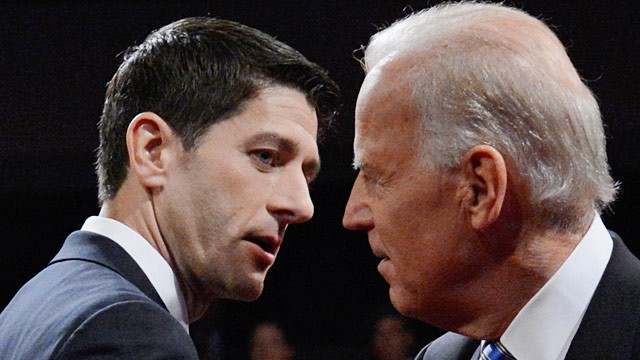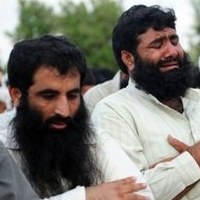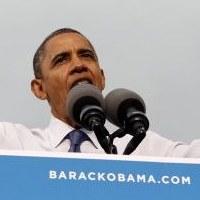![]()
Fri, Oct 12, 2012 | RubinReports | By Barry Rubin

Vice President Joe Biden (R) and Republican vice presidential nominee Rep. Paul Ryan (L) of Wisconsin shake hands after the vice presidential debate at Centre College, Oct. 11, 2012, in Danville, Ky. (Michael Reynolds/Pool/AP Photo)
While most of the vice-presidential debate was on domestic issues, there was some discussion about Iran that provoked controversy.
Republican vice-presidential candidate Paul Ryan said:
“We cannot allow Iran to gain a nuclear weapons capability. Now, let’s take a look at where we’ve gone — come from. When Barack Obama was elected, they had enough fissile material — nuclear material — to make one bomb. Now they have enough for five. They’re racing toward a nuclear weapon. They’re four years closer toward a nuclear weapons capability.”
According to the AP fact-checkers:
“Ryan’s claim is misleading. Iran isn’t believed to have produced any of the highly enriched uranium needed to produce even one nuclear weapon, let alone five. That point isn’t even disputed by Israel, whose Prime Minister Benjamin Netanyahu implored the world at the United Nations last month to create a “red line” at enrichment above 20 percent. Iran would have to enrich uranium at much higher levels to produce a weapon. There is intelligence suggesting that Iran has worked on weapon designs, but not that it has developed a delivery system for any potential nuclear warhead.”
The response is correct in the sense that Ryan overstated where Iran is at. But it ignored his key point: “They’re four years closer toward a nuclear weapons capability.” Would Romney have done better if he was in office? That’s debatable, of course, but it should be noted that the Obama Administration essentially wasted the first two years of its term, refused to back the Iranian opposition even verbally at the moment of crisis, and made Iran more confident of victory through its desperate effort to make friends with Tehran. The problem is that Obama did not do anything effective against Iran’s nuclear weapons’ drive. That is a valid point though, again, what would Romney have done during the same period?
Clearer, however, is the unfairness of the AP critique of Ryan on a second point. In AP’s account:
“Ryan…notes that there have been four rounds of U.N. sanctions on Iran to deter its nuclear program, three during the Bush administration and one under Obama. ‘And the only reason we got it is because Russia watered it down and prevented the sanctions from hitting the central bank. Mitt Romney proposed these sanctions in 2007. In Congress, I’ve been fighting for these sanctions since 2009. The administration was blocking us every step of the way.’’ He also noted the administration has granted 20 waivers to the sanctions.”
The AP sharply disagrees:
“The argument that the administration was watering down or delaying sanctions is misleading. For sanctions to work, they need maximum global agreement and cooperation. Russia watered down U.N. sanctions not only under Obama, but also under Bush. And it’s highly unlikely that a Romney administration, particularly led by a candidate who says Russia is the biggest geostrategic threat to the U.S., would be able to get Russia completely on board with what the U.S. wants to — either in Iran or Syria.
“The more absolute U.S. sanctions that Ryan and others have pushed in Congress would have punished U.S. allies, including most countries in Europe as well as Japan and South Korea, along with good friends like India and Singapore — without the exemptions that were put in place.
“The administration has indeed granted 20 waivers, to countries that made significant reductions in Iranian oil imports. And the sanctions are pinching; Iran has been convulsed over the past week with protests over the collapse of its currency, which most people say is a direct result of the sanctions that the U.S. and others have imposed.
This response is misleading and downright silly.
As noted above, the Obama Administration did assume that it needed a long period to prove it had done everything possible to conciliate Iran. Thus almost two years were lost. The fact is that most of America’s European allies were ready to move much earlier. In the end, the Obama Administration got the same kind of deal at the UN it could have obtained in 2009.
Ryan actually understates the watering down. Not only Russia but also China and Turkey got a free pass on the sanctions. Yes, China cut back on its purchases at times but then raised them again. The waivers in fact did not go to those who made significant progress but to those who opposed the sanctions and wanted to make money.
Moreover, Ryan is quite correct that Congress wanted tougher sanctions and if the United States had instituted them the great majority of important countries would have complied. As for those who would have ignored the tougher sanctions, they are the same ones who ignored the weaker sanctions. The statement about hurting South Korea and Singapore is ridiculous: they would only have been hurt if they had ignored the sanctions.
While Ryan was trying to score points and overstated the case, he was essentially quite correct. How much more pressure additional sanctions would have put on Iran is debatable but the fact-checkers are adopting the same basic approach as the Obama Administration: Rather than show leadership and press for more, the United States should have accepted the views of opponents and tailored the sanctions to their demands.
What’s amazing is the unspoken assumption that sanctions should be designed so as not to injure or pressure those who want to break them. Indeed, the idea accepted is that those who don’t intend to observe the sanctions get to determine how high they will be set. America’s role is thus not to lead but to satisfy the least reliable partners.
Vice-President Joe Biden made two statements far more inaccurate than anything Ryan said without arousing the wrath of the AP fact-checkers. One was Biden’s denial that the now-deceased U.S. ambassador to Libya had requested more security. The day after the debate, U.S. State Department officials testified about the requests. Presumably, since the terror attack in Benghazi became so controversial, Biden should have known about this situation days if not weeks ago.
The other concerned U.S.-Israel relations over Iran:
“The Israelis and the United States, our military and intelligence communities are absolutely the same exact place in terms of how close – how close the Iranians are to getting a nuclear weapon. They are a good way away. There is no difference between our view and theirs. Both the Israelis and we know — we’ll know if they start the process of building a weapon.”
In fact, the idea that Israel and the United States have the same view on where Iran is in the process of getting atomic weapons and Tehran’s intentions in that regard are quite different. This reality has been highly publicized and is quite clear from Prime Minister Benjamin Netanyahu’s statements on the subject.
Barry Rubin is director of the Global Research in International Affairs (GLORIA) Center and editor of the Middle East Review of International Affairs (MERIA) Journal. His latest book, “Israel: An Introduction“, has just been published by Yale University Press. Other recent books include “The Israel-Arab Reader” (seventh edition), “The Long War for Freedom: The Arab Struggle for Democracy in the Middle East” (Wiley), and “The Truth About Syria” (Palgrave-Macmillan). The website of the GLORIA Center and of his blog, Rubin Reports. His original articles are published at PJMedia.



 RSS
RSS










Latest Comments
Hello Mike, Thank you for your positive feedback to the article. I felt there wasn’t too much critical analysis of ...
Thanks for this considered and well constructed article. A follow up article on the manner in which the editorial contro...
THE CLUELESSNESS OF CLAIMING THAT OBAMA'S MIDDLE EAST POLICIES WERE A FAILURE CANNOT BE FURTHER FROM THE TRUTH, WHAT THE...
As long as Obama is the president of the usa do not trust the us government......
Thank you for an good read....